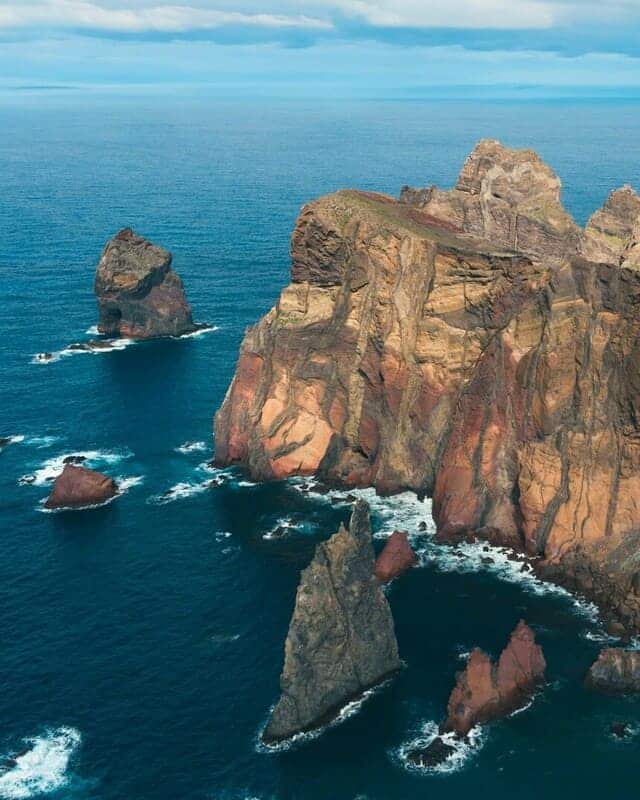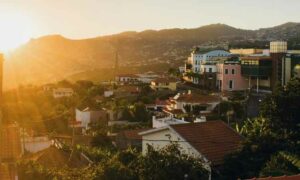Welcome to the comprehensive guide to obtaining your Madeira Golden Visa in 2024. The Portugal Golden Visa program is a residency-by-investment scheme, introduced by the Portuguese government in 2012 to attract foreign investment. The scheme allows non-European Union (EU), non-European Economic Area (EEA), and non-Swiss nationals to obtain temporary residence in Portugal.
After five years of maintaining the investment, the Golden Visa holder qualify for permanent residence in Portugal and can even apply for citizenship, provided you meet naturalization requirements.
If investing in Madeira sounds tempting, the following article is for you. This guide take you through everything you need to know about the Madeira Golden Visa, including requirements, benefits, and necessary documents. Here’s what we’ll cover:
- Overview of the Portuguese Golden Visa program
- Available investment types for 2024
- Updates on the Portugal Golden Visa ending
- Golden Visa program benefits
- Requirements
- How to get EU citizenship and permanent residency in Portugal, and more.
What is the Portugal Golden Visa program?
The Portuguese Golden Visa, also known as the residence permit for investment activity (ARI), is a five-year residency-by-investment scheme designed for non-EU nationals.
A highlight of the Portuguese Golden Visa is that it allows investors and their family members to live, work, and study in Portugal. The visa also grants holders the opportunity to travel visa-free in Europe’s Schengen Area.
Another attractive benefit of the Golden Visa Portugal is the opportunity for investors to become permanent residents or Portuguese citizens if the qualifying investment is kept for at least five years.
Investors from all around the world seek Portuguese residency through the scheme and since the inception of the program, over 20,000 Golden Visas have been granted.
Madeira Golden Visa News: What to Expect in 2024?
The Portugal Golden Visa program has undergone significant changes and the program no longer accepts real estate investments.
However, there are several attractive investment options still available for applicants. In 2024, the program is shifting focus towards investment funds, with a diverse array of sectors offering distinct investment mandates.
This change is expected to present new opportunities for Golden Visa investors looking to diversify their portfolios within the program. Additionally, 2024 is anticipated to introduce new options in the cultural and arts category, offering applicants alternative ways to obtain the highly coveted residence permit.
For more information, including continuous updates on the topic, please consult our articles: Portugal Golden Visa Ending: Everything We Know So Far and Portugal Golden Visa Changes, Updates & New Rules for 2025
You’ll discover how you can obtain the Madeira Golden Visa through alternative investment options in the following section.
Alternative Golden Visa Investment Routes for Madeira Golden Visa
Fund
Subscription
Scientific
Research
Job
Creation
Cultural
Investment
Scientific research
Invest €500,000 or more in research activities conducted by public or private scientific research institutions.
Job creation
Company incorporation and creation of ten jobs amounting to a minimum value of €500,000.
Cultural investment
Support the arts or reconstruction of national heritage with an investment of at least €250,000 (or €200,000 if located in a designated low-density area)
Fund subscription
Make a contribution to a qualified investment fund worth at least €500,000. The options for this investment type are as follows.
Venture capital funds
Venture capital funds, also known as Fundo de Capital de Risco (FCR), are recognized as a valid investment for those seeking to apply for Portugal’s Golden Visa. By investing a minimum of €500,000 in an FCR fund that is eligible for the Golden Visa, investors can readily apply for Portugal’s residency-by-investment program and instantly gain access to the program’s perks.
Although ‘venture capital’ may seem intimidating and complex, it merely represents investment funds managed by seasoned professionals who aim to invest in startups or medium-scale projects with robust growth potential.
Each fund follows a specific, well-structured investment strategy, focusing on sectors like energy, industry, technology, healthcare, or real estate. These funds are overseen by Portugal’s regulatory authority, the CMVM.
Capital growth funds
Potential Golden Visa holders can also invest in capital growth funds. Capital growth funds typically explore the residential market either by refurbishing buildings in prime locations like Lisbon or Porto or by constructing new properties. Profits generated from one project are generally used to fund subsequent projects within the fund’s lifespan. Therefore, all capital and profits are usually distributed upon fund liquidation after the completion of all projects.
Dividends and growth funds
Dividends and growth funds, on the other hand, invest in income-generating assets such as retail parks, warehouses, and hotels, potentially offering annual dividends once all the capital is deployed.
Finance real estate funds pursue an alternative strategy, emphasizing preferential cash flows, albeit at lower returns. This strategy often involves the fund lending a substantial portion of its capital to companies (SPVs) holding real estate assets while acquiring a smaller equity stake in them.
In essence, such funds’ returns predominantly reflect the fixed income from these debt instruments.
Alternative Golden Visa in Madeira Route: Investment Funds

To qualify for the Madeira Golden Visa via the investment fund option, foreign investors must make a capital transfer of €500,000 or more into Portuguese investment or venture capital funds.
These funds should primarily concentrate on capitalizing companies incorporated under Portuguese law, with a minimum maturity period of five years at the time of investment. Additionally, at least 60 percent of the investment’s value should be directed toward commercial companies situated within the country.
The Golden Visa minimum stay requirement is spending a minimum of seven days in Portugal for the first year and then no less than 14 days for each subsequent two-year period after the first year. You must also maintain your investment activity for these five years. This allows you to keep your residence permit and convert it to a permanent residence permit after five years.
For more information on investment options, see our detailed blog post: Portugal Golden Visa Investment Fund options.

Madeira Golden Visa Requirements
To qualify for the Madeira Golden Visa, you must fulfill the following requirements:
- Have a clean criminal record. If you don’t have a clean criminal record, a lawyer should analyze your case.
- Be either non-EU, non-Swiss, or non-EEA national
- Minimum investment of €250,000, with a range of investment routes to choose from
- Spend an average of 7 days per year in Portugal, guaranteeing a total of 14 days during the validity of each residence card (issued with a validity of 2 years)
Minimum stay requirement
The Golden Visa requires investors to spend an average of 7 days per year in Portugal, guaranteeing a total of 14 days during the validity of each residence card (issued with a validity of 2 years).
Golden Visa investment requirement
Golden Visa holders are required to present supporting evidence that they have made the investment of the minimum amount required. A declaration of honor compromising to maintain the investment for five years is also needed.
Required documents
The following documents are required to apply for the Golden Visa Madeira:
- Portugal Golden Visa application form
- Copy of a valid passport and travel documents
- Declaration from your bank in Portugal confirming the transfer of funds from abroad
- Proof of health insurance in Portugal (only required if the investor resides in Portugal)
- A background check or a police clearance letter from your country of origin
- A declaration of honor compromising to maintain the investment for five years
- Documents showing a good standing with the Portuguese Tax and Customs Authority
- Document showing non-enrollment or a good standing with the Social Security
- A receipt showing that you already paid the application processing fee
- Note that the certificates of criminal records or police clearance letters must have been issued no more than 90 days before submitting your application.
NIF number and Portuguese bank account
To get a Portuguese Golden Visa, you’ll need to obtain a NIF (Número de Identificação Fiscal). The NIF is your tax identification number, assigned by the Portuguese tax authorities, and is essential for various transactions like opening a bank account, buying property, signing contracts, and paying taxes.
You can apply for a NIF by visiting a local tax office, Citizen Shop, or through a legal representative. However, it can be challenging to get an appointment due to long queues.
The Golden Visa requires a qualifying investment, which must be maintained for five years. You’ll be required to open a Portuguese bank account to do that. Global Citizen Solutions can introduce you to an English-speaking banker in Portugal who can help you open an account even before you arrive in the country.
Madeira Golden Visa: Example Taxes and Fees
Here’s the breakdown of costs associated with the Madeira Golden Visa:
Initial application costs for Golden Visa in Madeira
Legal fees for Golden Visa application: For a single applicant, the fees range from €5,000 to €8,000. Note that dependents under 18 years old can be included in the application without any additional charges.
Extra Golden Visa application fees: For any dependents aged 18 years and above, the cost varies between €500 and €2,000. Remember, children are exempt from these charges.
Costs for renewal
Legal fees for Golden Visa renewal: For a single applicant, these fees range between €1,000 and €2,500.
Extra renewal fees: For dependents aged 18 and above, the cost ranges between €500-€2,000. Again, children are not subject to these charges.
Keep in mind that there might be additional fees depending on the type of investment you choose and whether you decide to enlist the services of a lawyer for your application.
Getting Madeira Citizenship Through the Golden Visa
After five years of being a legal resident in Portugal with the Golden Visa, the investor and his family can apply for permanent residency and/or Portuguese citizenship.
However, Golden Visa investors must also keep their investments in Portugal for at least five years, and fulfill the requirement of having a basic understanding of the Portuguese language (A2 level). This can be done either through a language course or the Portuguese language test.
Holders of a Portuguese passport can enjoy several benefits such as the right to live, work, and study anywhere in the European Union and travel visa-free to 174 destinations.
Buying Property in Madeira
Purchases within the real estate market in Madeira, Portugal, or the Azores are no longer an option for the Portugal Golden Visa program. However, you don’t have to give up on your dream home just yet.
Foreigners are still welcome to buy property on Madeira, and the island remains an attractive destination for many reasons. Its stunning natural beauty, including lush landscapes and picturesque coastlines, makes it a desirable place to live. The island enjoys a mild, pleasant climate year-round, which appeals to those seeking a comfortable environment.
Madeira offers a high quality of life, excellent healthcare, and educational facilities. The cost of living is relatively affordable compared to many other European destinations, making it a practical choice for expatriates. The local community is known for being friendly and welcoming, ensuring newcomers feel at home quickly.
Buying property in Madeira can be a sound investment, as the real estate market has shown steady growth.
Whether you are looking for a vacation home, a retirement spot, or a new place to start a life, Madeira provides diverse property options, from modern apartments to traditional houses with breathtaking views.
Property Taxes in Madeira
Property taxes in Madeira include Municipal Property Transfer Tax (IMT), Stamp Duty on Purchase, and Municipal Real Estate Tax (IMI). It’s important to consider these while planning to buy property in Madeira.
Municipal Property Transfer Tax (IMT)

Three key criteria come into play when calculating this tax:
- The type of property (urban or rural)
- The location of the house (mainland Portugal or the autonomous region of Madeira)
- The purpose of the purchase (primary or secondary residence).
Certain circumstances, such as buying for resale or urban rehabilitation, may qualify you for an IMT tax exemption.
Stamp Duty on purchase
Stamp duty, or Imposto de Selo, is charged on deeds, contracts, mortgages, and loans. The rate of this tax varies according to the type and value of the property. The tax rate for different types of deeds or operations ranges between 0.4 percent and 0.8 percent.
Stamp duty is paid to the notary when signing the sale deed, with a rate of 0.8 percent. If you take out a mortgage, you’ll also need to pay stamp duty, with the rate dependent on the repayment period. Stamp duty is not required for corporate property ownership transactions.
Municipal Real Estate Tax (IMI)
In Portugal, property owners are subject to a property tax known as Imposto Municipal Sobre Imóveis (IMI). This tax differs by municipality, as each municipal assembly sets its own rate. The IMI tax revenue supports the maintenance of public infrastructure within Portuguese municipalities, so it could be compared to the UK’s council tax.
This tax applies if you own the property on the final day of the tax year in question. To calculate the IMI tax, you simply multiply the taxable patrimonial value (TPV) of the property by the applicable rate.
The tax rate for properties varies from 0.3 percent to 0.45 percent. For rural properties, the rate is 0.8 percent, while urban properties fall within the aforementioned range. Properties revalued since 2004 are taxed between 0.2 percent and 0.5 percent, whereas those valued before 2004 range from 0.4 percent to 0.8 percent. If a property is owned by a corporation based in a “blacklisted” jurisdiction, the tax rate is a flat 7.5 percent.
Certain conditions might qualify you for an exemption from the IMI tax. If you intend to use the property as a permanent residence or lease it out, it could be exempt from the IMI tax for three years. A permanent exemption might be possible under certain income conditions.
Why choose Madeira?
Madeira Island is one of the two autonomous regions in Portugal and also forms part of the Schengen Area. Surrounded by the Atlantic Ocean and made up of breathtaking mountains, it’s perfectly complimented by the thriving city amenities, warm climate, and the cultural heritage of the Portuguese people.
Obtaining a Portugal Golden Visa residency permit for Madeira allows you the opportunity to enjoy the freedom of travel within the Schengen Area and learn the Portuguese language with ease while enjoying an incredible quality of life with family members.
all this while also offering a pathway to permanent residency. Invest in under the Madeira Golden Visa scheme in 2023 and secure your slice of paradise in this beautiful archipelago.
Madeira Golden Visa: Best Places To Live
Funchal, Camara de Lobos, Ponta do Sol (PDS), Garajau, and Machico are among the most popular places for Golden Visa holders to live in Madeira. Each offers unique benefits, from the urban vibes of Funchal to the beautiful seafront views of Garajau. Note that there are other locations you might enjoy not listed here available to consider for living in Madeira, such as the island of Porto Santo in Madeira which offers beautiful mountain views.
Funchal
Funchal is the bustling capital of Madeira, located in a natural amphitheater-shaped valley with stunning ocean views and a beautiful mountainous backdrop. The city is home to a mix of old and modern architecture, with historical landmarks like the Sé Cathedral standing next to contemporary shopping centers. Funchal is also known for its vibrant farmers’ market, Mercado dos Lavradores, where you can find a variety of exotic fruits and traditional embroideries.
Camara de Lobos
Camara de Lobos is a charming fishing village noted for its picturesque bay filled with colorful boats. The region is known for its traditional lifestyle and is a favored spot for artists due to its stunning landscapes and vibrant colors. It’s famously known for its connection to Winston Churchill, who loved painting its beautiful scenery. The village is also the origin of the traditional drink, Poncha, made from local rum, honey, and lemon.
Ponta do Sol (PDS)
Ponta do Sol, literally the “Point of the Sun,” is the sunniest spot in Madeira, ensuring warm and sunny weather for most of the year. With its terraced landscapes, beautiful pebble beach, and stunning backdrop of the mountains, Ponta do Sol provides perfect settings for outdoor activities like surfing, hiking, and paragliding. It is also home to the oldest existing parish church in Madeira, the Church of Nossa Senhora da Luz, dating back to the 15th century. Interestingly, Ponta do Sol is the location of the Digital Nomad Village initiative – a coworking space in the center of the town with free access to wifi and working spaces for digital nomads.
Garajau
Garajau is known for its pristine beach, Praia do Garajau, which is a nature reserve and one of the finest diving sites in Madeira. Its crystal clear waters are home to diverse marine life, and the imposing Christ the King statue, overlooking the area from the clifftops, is a notable landmark. The name Garajau itself is interesting as it refers to a species of seabird, the tern, which is common in this area.
Machico
Machico is the second biggest city in Madeira and is filled with historical significance. It was the landing site of the first discoverers of the island. Today, Machico boasts a beautiful mix of the old and new, with historical buildings, such as the Church of Our Lady of the Conception, and a modern artificial sandy beach.
Why choose Global Citizen Solutions for your Portugal Golden Visa?
- Global approach by local experts: A team of experienced local case executives, immigration lawyers, and investment specialists based in Portugal.
- Independent service:We are not a marketing agency for any projects. You will access all eligible routes for the Golden Visa, with over 40 vetted qualifying investment options, so you can decide on the best option for you.
- 100% approval rate: We have the unique distinction of never having had a Golden Visa case rejected and have helped hundreds of clients from more than 35 countries.
- All-encompassing solution: Our dedicated onboarding and immigration teams will assist you throughout the process and beyond with a single channel of communication.
- Transparency: Our fees are clear and detailed, covering the entire process with no hidden costs.
- Privacy: Your personal data is stored within a GDPR-compliant database on a secure SSL-encrypted server.
To see the full list of reasons why to work with Global Citizen Solutions for your Portugal Golden Visa, you can find out more here: Why Work with Global Citizen Solutions for Your Golden Visa Portugal Application?

Frequently Asked Questions about the Golden Visa in Madeira
Can you get a Golden Visa for Madeira?
Yes, you can get a Golden Visa for Madeira. Portugal’s Golden Visa program applies to the whole of Portugal, including the autonomous region of Madeira Island.
This means you can invest in Madeira, fulfilling the minimum investment requirement, to apply for a Golden Visa. The specific investment options and amounts applicable are the same as for mainland Portugal.
In exchange for a minimum investment into, you are granted residency status in Portugal.
When you have the Golden Visa in Madeira, if you maintain your residence permit and investment for five years, you qualify for permanent residency. You then have the option of applying for Portuguese citizenship.
How do I become a citizen of Madeira?
Becoming a citizen of Madeira, which is part of Portugal, requires you first to become a Portuguese citizen.
One route is through the Golden Visa program. In exchange for foreign investment, Golden Visa holders are granted a residence permit. After holding a Golden Visa for five years, you can apply for permanent residency.
Following a year of permanent residency, you’re eligible to apply for Portuguese citizenship, provided you pass a basic Portuguese language test and show ties to the country.
It’s also worth noting that through the Golden Visa program, you’re not required to live permanently in Portugal to gain citizenship. The program requires a minimum stay of seven days in the first year and fourteen days in the subsequent two-year periods.
What are the investment options available for the Madeira Golden Visa?
Here are the Madeira Golden Visa investment routes:
- Make a contribution to Portuguese investment funds
- Investment or donation in the arts or reconstruction of national cultural heritage
- Contribution to private scientific research institutions
- Creation and maintenance of ten jobs during the required period
- Incorporation of a commercial company in the national territory or reinforcement of a company’s share capital combined with the creation of five or maintaining ten jobs (five of them permanent)
What are the benefits of obtaining a Madeira Golden Visa?
Obtaining a Madeira Golden Visa offers numerous benefits:
- Family reunification: You can include your spouse, dependent children, and parents in your application.
- The right to live, work, and study in Madeira: You and your family gain the right to reside in Madeira, work, and access quality education.
- Visa-free travel in the Schengen Area: The Golden Visa allows for visa-free travel within 27 European countries.
- European citizenship eligibility: After five years of residency, you can apply for Portuguese citizenship, granting you the right to live, work, and study anywhere in the European Union.
- Several attractive investment routes: The Golden Visa requires a qualifying investment, which can be financially rewarding and contribute to Madeira’s growing economy.
- Short Stay Requirement: You only need to spend an average of seven days per year in Portugal annually, offering flexibility for those not ready to relocate immediately.
Are real estate investments available for the Madeira Golden Visa?
Previously, applicants could make any real estate investment in Portugal to acquire their residency, but the law has since been reformed and real estate investments are no longer eligible.
As of 2024, the available investment types for the Portuguese Golden Visa program include setting up a business to create employment, donations to cultural heritage, private equity funds, and investing in scientific and technology research.


